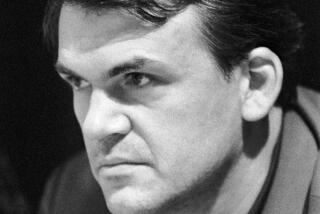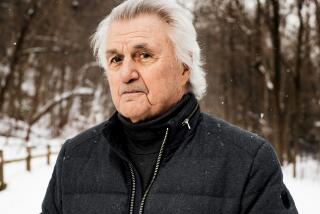Before Kundera, There Was Hrabal : DANCING LESSONS FOR THE ADVANCED IN AGE, <i> By Bohumil Hrabal</i> . <i> Translated from the Czech by Michael Henry Heim (Harcourt, Brace Co.: $14; 128 pp.)</i>
- Share via
When accepting his Oscar for “Closely Watched Trains,” the film based on a novel by Bohumil Hrabal, Czech director Jiri Menzel called a film or novel “a gesture of love towards man. And when love is in question, I believe that Mr. Hrabal is most qualified; that is why I placed myself at his services.”
While Hrabal’s is hardly a household name in America, there are still in print four previously translated novels and one collection of stories by the man whom Milan Kundera calls “Czechoslovakia’s greatest living writer.” And now we have “Dancing Lessons for the Advanced in Age,” a Rabelaisian tale first published in Czechoslovakia in 1964, and splendidly translated here by UCLA’s Michael Henry Heim.
In this short novel, composed of a single tumbling sentence, Hrabal’s unnamed narrator serves up a monologue of such stamina and velocity that each comma, dash and semicolon seems like a gasp for oxygen for both reader and narrator. He offers his ars erotica to six sunbathing women. From the get-go he is so irrepressibly misogynist--his procrastinations so urgent and eccentric--I imagined that the sunbathers might have felt ambushed by some Czech incarnation of Harpo Marx, who, after decades of pent-up muteness, spills forth a lifetime of madcap episodes.
The narrator is “pushing 70.” A shoemaker by profession, who at times in his life wore pince-nez eyeglasses and carried a stick with a silver mounting to look like a composer. He proves at once volatile, cantankerous, cloying, lovable and impetuous; it’s as if he considers himself a volume of agitated nostalgia to be opened at whim and read from aloud. But, as he proclaims in a characteristic flash of insight, “no book worth its salt is meant to put you to sleep, but to make you jump out of bed in your underwear and beat the author’s brains out. . . .”
I would not have been surprised if the sunbathers, feeling less entertained than violated, had indeed pummeled him. Or at least clasped hands over ears: “. . . there were windows in the brothel doors and I’d peek in, one young lady opened the door and said, Can I do anything for you, soldier boy? some of them did it for a loaf of bread, but Lt. Jovorka told us we’d be better off with non-professionals, it took a few chocolates, but then it was true love, I found a schoolmaster’s daughter who would do it for a nice white roll, but all I had was our army bread, so she kissed my hand and in exchange I told her about the time I spent in Split guarding an old freight car filled to the brim with acrasite, which they used to blow up bridges and which looked like flypaper or a powder you buy at the pharmacy, and then I read her excerpts from the dream book, chatting with a young lady means a rash venture, frolicking with a hussy at night means beware of beguiling words, and then I told the schoolmaster’s daughter in my best Polish that the young miss was pleasing to the eye and she told me that the young master was too and she hoped the shooting would soon cease. . . .”
My, my, he does go on.
Our scurrilous monologuist--with his nostalgia for the Hapsburg empire and his obsession with an esoteric “Batista’s book on sexual hygiene”--is a reappearance of one of my favorite Hrabalian characters, mischievous Uncle Pepin, from “The Little Town Where Time Stood Still,” who, like a one-man invasion force, “went to visit my brother for two weeks and stayed 30 years.”
In “Dancing Lessons for the Advanced in Age,” Pepin (though he is not so-named) has a howling desire to insert himself in history. His rants on the glories of the past, his intermingling of Czech history with personal fantasies, are replete with the refrain, “I wanted to be a hero.” He comes off as both egomaniac and oral historian. More than occasionally, the sunbathers are strafed by anti-Semitic spewings, all in service of the narrator’s comic deliberation.
With their spontaneous tones of high disgust, these register as ugly, indelible moments, and I recoiled, not only at the informing sensibility, but at the historical accuracy. Hrabal has an especially skilled “ear” for listening in on some of his countrymen’s perverse sentiments:
“A dandy of a Jew gave me a gulden to shine up his belt and his gun for him, he was going into town to establish some international relations, as he put it, but along came our beast of a Sgt. Broul, 6 1/2 feet of bad blood, and said, where’s the Jew boy? Went to town, I said, well the Serge he starts cursing . . . because Freiherr Von Wucherer has expressly forbidden soldiers from going on rampages in town, so he comes and lies down in the Jew’s bed and when the Jew staggers back after midnight, totally beat, Broul leaps up, knocks him down, kicks him all over the floor in his special uniform, and sends him out on guard duty, and when I went out to relieve him I found him swinging in the wind, hanging from a tree in a corner of the courtyard, strung up by his own hand and shiny belt, nobody appreciates that kind of thing anymore, when I told the story to some truck drivers in Liben they just laughed.”
Throughout nearly half a century of prodigious writing, Hrabal’s most expertly realized characters contain contradictions, similar to the way novelist Josef Skvorecky described Hrabal himself: “His biography is what we in Europe used to think of as ‘American’; a jack of all trades, he has been a traveling salesman, a steelworker, a dealer in scrap paper, a stagehand. He married a charming waitress who appears to have stepped right out of one of his stories, and he stylized himself into the figure of a beer drinker who thinks like an intellectual but speaks in the language of the palavering populace.
I’m thinking of Hanta, in “Too Loud a Solitude,” who has operated a trash compactor for 35 years and is a superb autodidact, with a workmanlike flair for metaphor: “And so everything I see in this world, it all moves backward and forward at the same time, like a blacksmith’s bellows, like everything in my press, turning into its opposite at the command of red and green buttons, and that’s what makes the world go round.” Or Ditie, the ambitious busboy at the Golden Prague Hotel, in Hrabal’s masterpiece, “I Served the King of England,” who desperately wants to run his own restaurant.
Simply put, first-hand experience informs Hrabal’s work with wonderful detail, deceptive folksiness, irascibility and charm. One of the grand patriarchs of the unprecedented cacophony of Czech film, writing and painting in the late 1960s, known as “Prague Spring,” Bohumil Hrabal has invented some of the most memorable characters in world literature.
“Dancing Lessons for the Advanced in Age” stands up to the best of Hrabal. So many novels (forgive the preachiness here), for all of their technical skill, finally display a dead indifference to sheer imagination informed by historical alertness. Not so with Bohumil Hrabal. His novels enhance the soul, distill complicated human behavior to its basic--albeit at times repugnant, at times joyful--motivations, telescope in on village life and spin yarns that no one practicing naturalistic fiction (since Isaac Bashevis Singer) can spin with such unmitigated savvy.
More to Read
Only good movies
Get the Indie Focus newsletter, Mark Olsen's weekly guide to the world of cinema.
You may occasionally receive promotional content from the Los Angeles Times.









